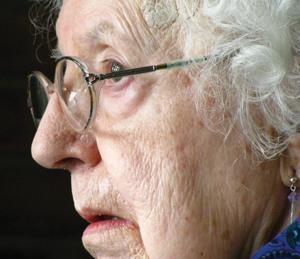Preventing elder abuse: Nigel Dodds
 Parliament will debate Nigel Dodds’ Bill to tackle the abuse of older people in the new year. Stephen Dineen reports.
Parliament will debate Nigel Dodds’ Bill to tackle the abuse of older people in the new year. Stephen Dineen reports.
Nigel Dodds’ private members’ Bill aimed at highlighting and preventing abuse of older people and vulnerable adults will have its second reading in the House of Commons on 20 January. The Support and Protection for Elderly People and Adults at Risk of Abuse Bill, which enjoyed cross-party support at first reading, seeks to ensure training on how to recognise and respond to such abuse, promote local strategies for preventing abuse and provide assistance to victims.
At the first reading on 10 November 2010, Dodds said different forms of abuse affect hundreds of thousands of people across the UK every year and that abuse often goes unreported due to stigma, shame, dependence on the abusers as well as guilt or isolation. Stating that the benchmark of child protection should be used, Dodds said that his legislation would require abuse to be investigated, a more consistent and effective response by statutory providers, ensure better training and education, and offer enhanced guidance to the criminal justice system.
Speaking to agendaNi, Dodds said: “Part of the issue that I just wanted to focus [on] and highlight was that this needs to be taken much more seriously and in a more co-ordinated way across government.” He said his aim in producing the Bill is “promoting the need for a requirement on [social services] agencies to be aware of and to make this a priority.” The aspirational provisions of the Bill would apply across the UK, with the devolved administrations responsible for implementing the policies.
Support, at present, can be unco-ordinated and fragmented, with little formal contact between the relevant agencies and services, he claimed.
The DHSSPS says it has improved inter-agency working over the last two years, including financial support for establishing local and regional ‘safeguarding partnerships’.
Dodds told the Commons that there would be “immense benefit in bringing existing provisions together, including principles, definitions, a duty to investigate, clarification of powers of entry, powers to remove a perpetrator or perpetrators of abuse, and a duty of co-operation.”
In a UK-wide study of abuse and neglect of older people conducted by King’s College London and the National Centre for Social Research, published in 2007, 2.6 per cent of people aged 66 and over living in private households reported mistreatment involving a family member, friend or care worker during the past year. The predominant types of mistreatment were neglect (42.3 per cent of abuse), financial abuse (31.8 per cent), psychological and physical (18.2 per cent each) and sexual (9.1 per cent). Fifty-one per cent of mistreatment involved a partner, and 49 per cent another family member, with only 13 per cent of abuse reported to have been from a care worker.
The prevalence of abuse rises from 2.6 per cent to 4 per cent when incidents involving neighbours or acquaintances were included. The study stated that its findings were likely to represent an under-estimate of mistreatment.
Two per cent of people aged 66 and over in Northern Ireland suffered from mistreatment, according to the study, with neglect constituting half of this.
In his Commons speech, the DUP deputy leader added that a “major shift towards understanding the circumstances and situations that contribute towards abuse or render people vulnerable to it” was needed.
Earlier this year a cross-border qualitative study of older people’s understanding of elder abuse reported that some participants would be reluctant to tell anyone about mistreatment for fear of having to go into a nursing home, which was their biggest dread.
In Northern Ireland, the DHSSPS and the Department of Justice are currently developing policy on the safeguarding of vulnerable adults, with a framework to be issued for public consultation in 2012.
The details of Dodds’ Bill are expected to be published at committee stage if it advances past second reading.





